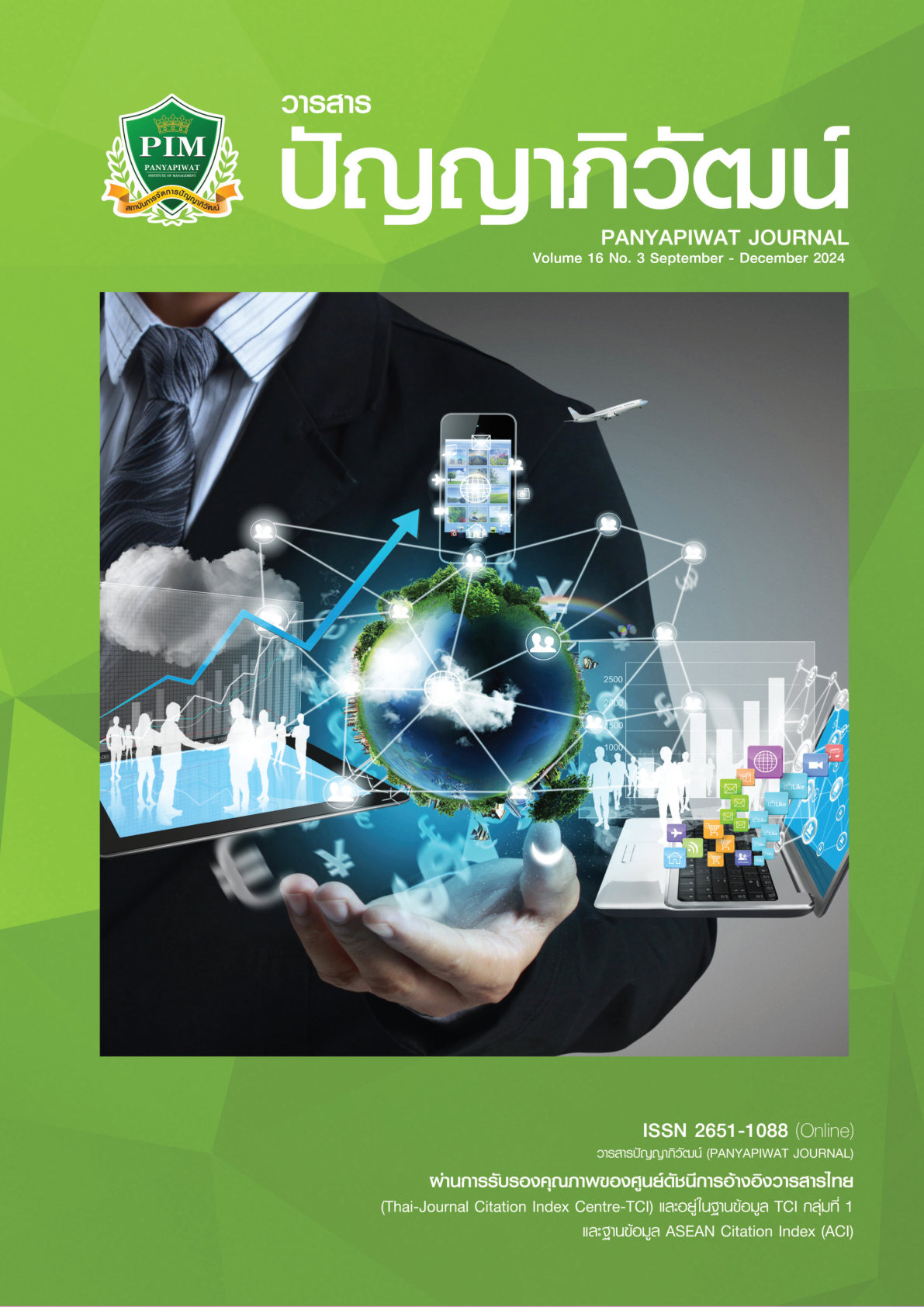FACTORS AFFECTING DECISIONS TO PURCHASE COSMETICS AMONG FEMALE CABIN CREW OF QATAR AIRWAYS
Main Article Content
บทคัดย่อ
This study investigates the decision-making process for purchasing cosmetics among female cabin crew at Qatar Airways. It explores how factors like nationality, age, marital status, education, position, and experience influence their choices. Additionally, it examines external factors (subjective norms, brand image, company regulations) and internal factors (perceived usefulness, brand trust, gratification shopping, green cosmetics awareness) on their purchasing decisions. A mixed-method approach was used, combining qualitative and quantitative research methodologies. Qualitative data were collected through semi-structured interviews with 20 cabin crew members (using convenience and quota sampling) segmented by position (F2: 40%, F1: 30%, CS: 20%, CSD: 10%). Quantitative data were collected through surveys from 400 cabin crew members (using purposive and quota sampling) again segmented by position. Statistics for data analysis included the frequency, percentage, mean, standard deviation, and hypothesis testing (t-tests, ANOVA, regression). The qualitative research identified “Company Regulations” as an additional factor. Crew members primarily purchase cosmetics required by the company, with lipsticks (deep red/pink) being the most popular choice due to company guidelines. Additionally, crew members mostly make independent decisions, with colleagues’ recommendations influencing brand selection. Cosmetics are also purchased for stress relief and self-gifting. The quantitative research found that most respondents were Asian, aged 26-30, single, with bachelor’s degrees and no prior flying experience. Age, position, and experience did influence purchasing decisions. External factors (subjective norm, brand image) and internal factors (perceived usefulness, gratification shopping) significantly affected purchasing decisions (p < 0.05).
Article Details

อนุญาตภายใต้เงื่อนไข Creative Commons Attribution-NonCommercial-NoDerivatives 4.0 International License.
“ข้าพเจ้าและผู้เขียนร่วม (ถ้ามี) ขอรับรองว่า บทความที่เสนอมานี้ยังไม่เคยได้รับการตีพิมพ์และไม่ได้อยู่ระหว่างกระบวนการพิจารณาลงตีพิมพ์ในวารสารหรือแหล่งเผยแพร่อื่นใด ข้าพเจ้าและผู้เขียนร่วมยอมรับหลักเกณฑ์การพิจารณาต้นฉบับ ทั้งยินยอมให้กองบรรณาธิการมีสิทธิ์พิจารณาและตรวจแก้ต้นฉบับได้ตามที่เห็นสมควร พร้อมนี้ขอมอบลิขสิทธิ์บทความที่ได้รับการตีพิมพ์ให้แก่สถาบันการจัดการปัญญาภิวัฒน์หากมีการฟ้องร้องเรื่องการละเมิดลิขสิทธิ์เกี่ยวกับภาพ กราฟ ข้อความส่วนใดส่วนหนึ่งและ/หรือข้อคิดเห็นที่ปรากฏในบทความข้าพเจ้าและผู้เขียนร่วมยินยอมรับผิดชอบแต่เพียงฝ่ายเดียว”
เอกสารอ้างอิง
Brand Finance. (2023). The annual report on the most valuable and strongest cosmetics brands. https://brandirectory.com/rankings/cosmetics
Ghazali, E., Soon, P. C., Mutum, D. S., & Nguyen, B. (2017). Health and cosmetics: Investigating consumers’ values for buying organic personal care products. Journal of Retailing and Consumer Services, 39, 154-163.
Grand View Research. (2023). Cosmetics market size, share and trends analysis report by product (skin care, hair care, makeup, fragrance), by end-user (men, women), by distribution channel, by region, and segment forecasts, 2023-2030. https://www.grandviewresearch.com/industry-analysis/cosmetics-market
Hrimtepathip, P. (2016). Factors affecting the purchase of face skin care of female consumer. College of Management, Mahidol University.
Lavuri, R., Jabbour, C. J. C., Grebinevych, O., & Roubaud, D. (2022). Green factors stimulating the purchase intention of innovative luxury organic beauty products: Implications for sustainable development. Journal of Environmental Management, 301, 113899.
Mohatlane, E. J. (2014). Back-translation as a quality control mechanism in Sesotho translation. Kamla-Raj Journal of Social Sciences, 40(2), 219-228.
Serirat, S. (2002). Management and organizational behavior. Dharmasarn Printing.
Skytrax. (2024). The world’s top 10 airlines of 2024 voted for by travellers around the world. https://www.worldairlineawards.com/worlds-top-10-airlines-2024/
Tanti, H., Praptini, Y., Masmira, K., Nidya, A., Ratri, A., Made, G., & Raras, K. (2020). Purchase behavior of millennial female generation on halal cosmetic products. Journal of Islamic Marketing, 11(4), 1295-1315.
Tavakol, M., & Dennick, R. (2011). Making sense of Cronbach’s alpha. International Journal of Medical Education, 2, 53-55.
Thummapawat, D., & Pawapootanon Na Mahasarakham, W. (2022). Factors affecting the efficiency of internal controls in financial and accounting of government hospitals in Mahasarakham. Vocational Education Innovation and Research Journal, 6(2), 58-67.
Tippayapornkul, P. (2016). Factors affecting customer decision to buy cosmetics online in Bangkok [Master’s thesis]. Graduate School, Silpakorn University.
Wattanasatiensin, S. (2018). The influence of hedonic shopping motivation, utilitarian shopping motivation, and browsing behavior on online impulse buying tendency. Thammasat University.
Zhang, J., & Zhou, M. (2019). Factors influencing consumer purchasing behavior of natural cosmetics: A qualitative study in Uppsala, Sweden [Master’s thesis]. Uppsala University.


